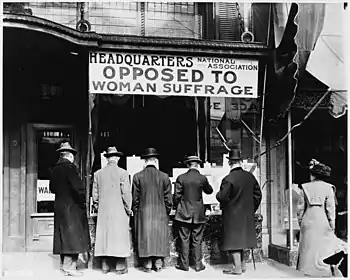Josephine Jewell Dodge
Josephine Jewell Dodge (February 11, 1855 – March 6, 1928) was an American educator, an early leader of the day nursery movement, and an anti-suffrage activist.
Early life and education
Josephine Marshall Jewell was born in Hartford, Connecticut in 1855. Her father, Marshall Jewell, was Governor of Connecticut and United States Postmaster General, among other government posts. Josephine Jewell left Vassar College without a degree in 1873 to accompany her father to St. Petersburg, Russia, when he was serving as a diplomat there.[1]
Career
Josephine Jewell Dodge sponsored the Virginia Day Nursery in New York City, a facility intended to provide child care to working mothers on the Lower East Side.[2] Her program developed in 1888 to become the Jewell Day Nursery, which had a greater educational component.[3] Dodge demonstrated her methods at the Columbian Exposition in 1893,[4] and in 1895, she was founder and first president of the Association of Day Nurseries of New York City in 1895, and part of the National Federation of Day Nurseries in 1898.[1]

Dodge's anti-suffrage activities occupied her later career. In 1911, she helped found and became president of the National Association Opposed to Woman Suffrage,[5] a post she held for six years; she also edited the organization's publication, "Woman's Protest." She was the target of a verbal attack at a 1915 "riot" between suffrage and anti-suffrage activists in Washington DC.[6] The same year, she spoke against suffrage in New Jersey: "The life of the average woman is not so ordered as to give her first hand knowledge of those things which are the essentials of sound government.... She is worthily employed in other departments of life, and the vote will not help her fulfill her obligations therein."[7] She countered accusations that anti-suffrage activists were supported by "liquor interests" in the hope of preventing Prohibition.[8] Although many historians assume that anti-suffragists had a conservative social agenda, their motivation was actually often different. Mrs. Dodge and others saw a danger in adding to the number of politically uninformed voters, which was already seen as a problem. She also believed that if women became involved in the disreputable world of partisan politics, they would lose some of their moral authority. [9]
A variety of rose was named for Dodge and was grown especially to decorate tables at an anti-suffrage meeting in New York's Hotel Astor.[10]
Personal life
Josephine Jewell married Arthur Murray Dodge, son of noted copper merchant [Phelps-Dodge Co], Congressman and philanthropist William E. Dodge, in 1875.[11] They had six sons and two daughters together; the girls died as infants, son Pliny died age 5 in 1889, and his brothers were Marshall, Murray, A. Douglas, Geoffrey and Percival.[12] Josephine was widowed when Arthur died in 1894.[13] She died in Cannes, France, in 1928, and was buried in Simsbury, Connecticut next to Arthur in the Dodge plot near their Weatogue summer home.[14]
A trove of Dodge's letters written in the year that Minister Jewell and the family spent in St. Petersburg, Russia are archived in the Special Collections library at Vassar College.[15] However the collection contains very little information about her anti-suffrage activities.
Her nieces by marriage included philanthropist Grace Hoadley Dodge and pro-suffrage social hostess Mary Melissa Hoadley Dodge, both daughters of William E. Dodge, Jr.[1]
References
- "Josephine Marshall Jewell Dodge" in Edward T. James, Janet Wilson James, and Paul S. Boyer, eds., Notable American Women, 1607–1950, A Biographical Dictionary, vol. 2 (Harvard University Press 1971): 492-493. ISBN 9780674627345
- Susan Goodier, No Votes for Women: The New York State Anti-Suffrage Movement (University of Illinois Press 2013): 30. ISBN 9780252094675
- L. P. S., "The Late Mrs. Arthur M. Dodge" New York Times (March 16, 1928): 16.
- "Child Care" in Alice O'Connor, ed., Poverty in the United States: An Encyclopedia of History, Politics and Policy (ABC-CLIO 2004): 152. ISBN 9781576075975
- "Low Cut Gowns and High Morals Suffrage and Sex; Mrs. Arthur M. Dodge Tells Women Decent Dress is More Important than Votes" The Courier (May 11, 1913): 1. via Newspapers.com

- "Near Riot When Suffragists and Antis Meet at Hearing Before Democratic Committee" Washington Herald (December 8, 1915): 1. via Newspapers.com

- "Woman Suffrage Battle Opens in New Jersey As Antis Unlimber Big Guns; Monster Mass Meeting Held in Trenton" Chatham Press (May 29, 1915): 7. via Newspapers.com

- "Mrs. Dodge Charges A Poison-Pen Plot; Declares Suffragists, with Endless Chain Postals, Are Repeating Liquor Attacks" New York Times (October 30, 1916): 9.
- Joe C. Miller: "Never a Fight of Woman Against Man: What Textbooks Don't Say about Women's Suffrage." The History Teacher, Spring 2015, p. 447-453. [http://suffrageandthemedia.org/source/never-fight-woman-man-textbooks-dont-say-womens-suffrage/
- "Anti-Suffrage Rose Named 'Mrs. Dodge'; Rich New Flower Graces Each Table at Brilliant Cafe Dansant and Tableaux" New York Times (April 6, 1915): 4.
- "A Social Event: Marriage of Miss Josephine M. Jewell and Mr. Arthur M. Dodge" New York Times (October 7, 1875): 1.
- "Murray W. Dodge, Banking Executive" Brooklyn Daily Eagle (December 7, 1937): 11. via Newspapers.com

- "Notable Birthdays Today" Asheville Citizen-Times (February 11, 1917): 4. via Newspapers.com

- "Mrs Arthur M. Dodge, Former Josephine Jewell, Foe of Woman Suffrage, Dies in France" New York Times (March 7, 1928): 25.
- Guide to the Josephine Jewell Dodge Papers, 1873-1874, Archives and Special Collections, Vassar College.
External links
- Photograph of children at the Jewell Day Nursery in New York City, 1999, in the New York Public Library Digital Collections.